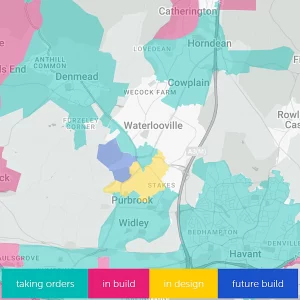Sponsored Links
UK ISP TalkTalk Slams Use of Domestic Broadband Services for Business Purposes
Posted: 25th Feb, 2011 By: MarkJ
 The business focused division of internet provider TalkTalk UK, which is aptly named Talktalk Business, has used a new survey to warn SME's against using domestic broadband connections in a corporate environment. The ISP claims that using such solutions, which are often a lot cheaper, could ultimately cost British firms £357m in lost labour and 32.4 million hours per month of staff downtime.
The business focused division of internet provider TalkTalk UK, which is aptly named Talktalk Business, has used a new survey to warn SME's against using domestic broadband connections in a corporate environment. The ISP claims that using such solutions, which are often a lot cheaper, could ultimately cost British firms £357m in lost labour and 32.4 million hours per month of staff downtime.The study itself found that 70% of small and medium sized businesses in the UK were still using domestic broadband connectivity instead of a business grade solution. Similarly 51% of firms did not recognise the difference between a domestic and business grade service.
The Transformation Director of TalkTalk Business, Andy Lockwood, said:
"Broadband connectivity is the lifeblood of any SME and impacts on virtually all aspects of its business performance. While being perfectly suited for all your online needs at home, domestic grade broadband is not designed to cope with the demands of running a business."
"Broadband connectivity is the lifeblood of any SME and impacts on virtually all aspects of its business performance. While being perfectly suited for all your online needs at home, domestic grade broadband is not designed to cope with the demands of running a business."
According to TalkTalk's study, SME's who did use domestic broadband connections experienced a reduction in productivity. Some 10% lost up to 5 hours each week to staff downtime, which was as a result of slower access, and 18% lost 2.5 hours. Elsewhere 44% of firms admitted that their domestic broadband package was simply too slow and 6% experienced technical faults.
Lockwood added:
"Because increasingly for businesses standard broadband isn't enough. So businesses need to know what other connectivity options are available - such as "Annex M" - a variant of broadband which can double the uplink speed - very important for businesses communicating with its customers, through to high-speed connectivity services such as Ethernet which operates at speeds from 10Mbps to 1Gbps."
"Because increasingly for businesses standard broadband isn't enough. So businesses need to know what other connectivity options are available - such as "Annex M" - a variant of broadband which can double the uplink speed - very important for businesses communicating with its customers, through to high-speed connectivity services such as Ethernet which operates at speeds from 10Mbps to 1Gbps."
Naturally TalkTalk Business, which makes a habit out of promoting business broadband services at domestic style prices, was quick to point out that its unbundled ( LLU ) broadband platform was now available from more than 2000 telephone exchanges (covering around 90% of properties in the UK).
A proper business broadband service should also run off a lower contention ratio (i.e. the number of other users sharing your local connection), come with a strong Service Level Agreement (SLA) and be able to offer value-added services beyond basic access (e.g. SIP/VoIP, web hosting, traffic prioritisation etc.).
Ironically one of the reasons that firms might be so confused about the differences between domestic and business broadband solutions is because ISPs frequently fail to mention issues such as contention. Many others don't even bother to explain and simply list the basic connection details. As a result some ISPs can get away with selling domestic grade broadband as a business service.
Search ISP News
Search ISP Listings
Search ISP Reviews
Latest UK ISP News








Cheap BIG ISPs for 100Mbps+
150,000+ Customers | View More ISPs
Cheapest ISPs for 100Mbps+
Modest Availability | View More ISPs
Latest UK ISP News
Helpful ISP Guides and Tips
Sponsored Links
The Top 15 Category Tags
- FTTP (6799)
- BT (3881)
- Politics (3075)
- Business (2767)
- Openreach (2663)
- Building Digital UK (2512)
- Mobile Broadband (2475)
- FTTC (2142)
- Statistics (2128)
- 4G (2092)
- Virgin Media (2024)
- Ofcom Regulation (1779)
- 5G (1732)
- Fibre Optic (1604)
- Wireless Internet (1595)
Sponsored
Copyright © 1999 to Present - ISPreview.co.uk - All Rights Reserved - Terms , Privacy and Cookie Policy , Links , Website Rules






























